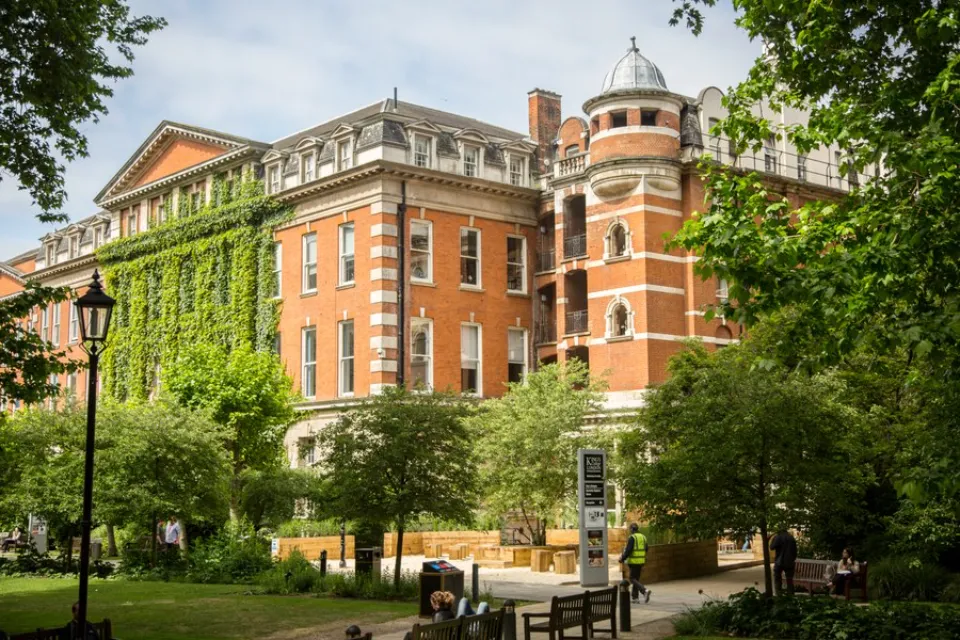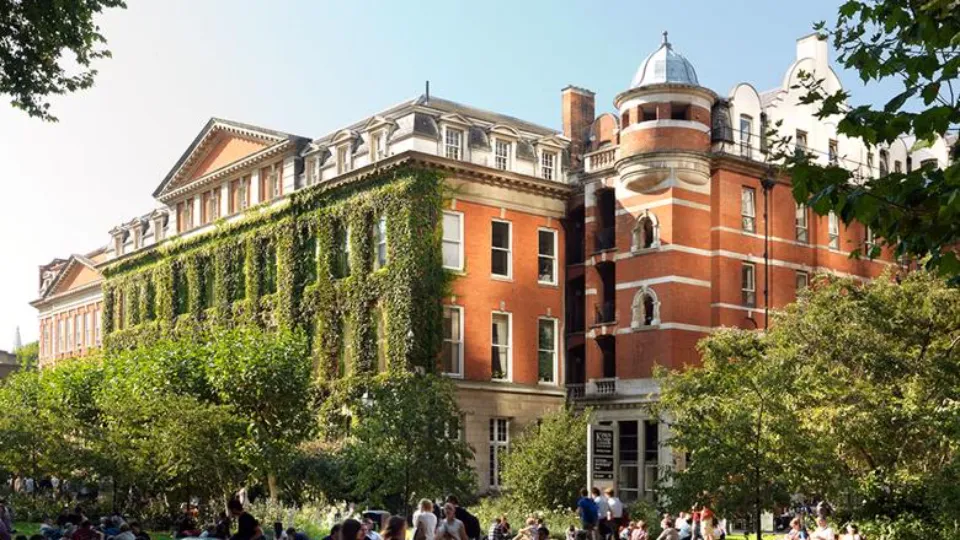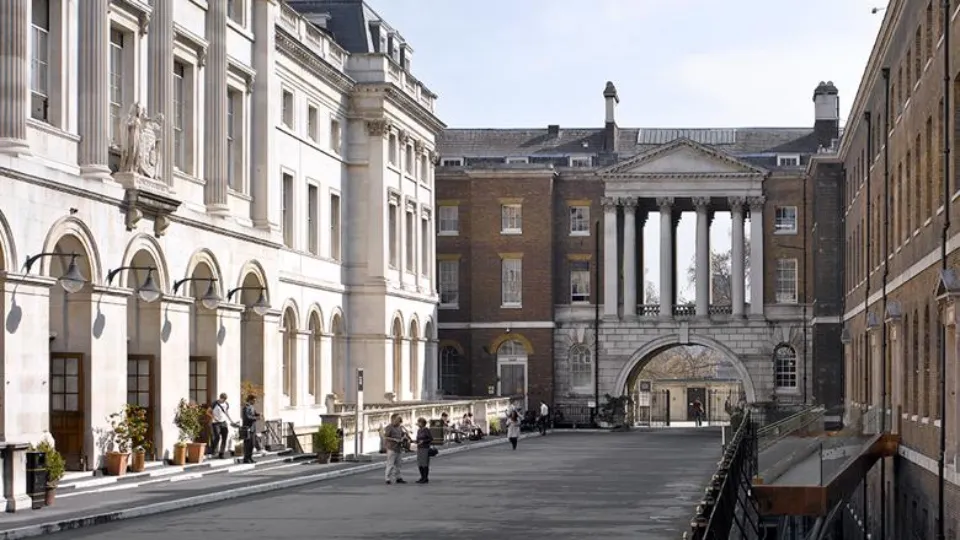Today, we will concentrate on King’s College London Medical School, a UK research-intensive university that is a part of the Russell Group.
In collaboration with renowned organizations like Guy’s, St. Thomas’, and King’s College Hospitals, King’s College London offers an integrated five-year medical degree. The course boasts a broad scope, instructing students in non-core subjects like the humanities and social sciences. Cattle dissections, lectures, seminars, and clinical placements all serve as teaching methods.
Let’s start with an overview of King’s College Medical School. Read More: A Complete Guide to Study at Birmingham Medical School
About King’s Medical School
The GKT School of Medical Education, or King’s College Medical School, is known. Guy’s Hospital, King’s College Hospital, and St. Thomas’ Hospital are the three organizations that house the Medical School campuses collectively known as GKT. King’s established a medical department in 1829, and after it merged with other hospitals, it grew closer to the Medical School we know today.
The Medical School has a long list of well-known alumni, including Sir James Black, winner of the Nobel Prize in Medicine, Richard Doll, who established the connection between smoking and cancer, Thomas Hodgkin, who discovered Hodgkin’s lymphoma, Sir Frederick Hopkins, who also discovered vitamins, John Keats, a well-known English poet, Dame Cecily Saunders, who invented the hospice concept, and Max Theiler, who won the Nobel Prize for developing the yellow fever vaccine.
What is Studying at King’s Medical School Like?

KCL makes use of integrated instruction. An integrated course consists of pre-clinical and clinical teaching hence the term integrated. The chance exists for students to put what they have learned in the classroom to use in a clinical setting. Due to this teaching method, patients are exposed to the class at all times.
Teaching and Assessment
Guy’s, King’s College, and St. Thomas’ are three well-known and busy hospitals in London where clinical teaching is based. The goal of the medical degree is to develop students’ capacity for critical scientific thought, as well as their capacity for outstanding teamwork, resilience, and adaptability.
Students are assessed through formative and summative assessments. Summative assessments are when students show mastery of the course standards and learning objectives, while formative assessments are when students receive feedback that does not count toward their degree scores. These summative evaluations come in the form of project reviews, written tests, and OSCEs.
Degree Content
- Stage 1
Students receive a foundation in population and biomedical sciences in Stage 1. It also equips you with the ability to start fusing clinical practice with skills.
- Stage 2
Stage 2 combines science and clinical practice in sections organized around the human life cycle and typical pathological processes. In a variety of clinical settings, this stage places a strong emphasis on the treatment of patients with common conditions. Students monitor patients for prolonged periods of time to learn how to deliver whole-person care.
The option of an intercalation year is available between Stages 2 and 3.
- Stage 3
Stage 3 is all about future practice and it includes the opportunity to undertake elective study abroad. Students conduct quality improvement projects and develop skills to transform patient and population health at home and abroad.
Graduate Entry Medicine MBBS
Students will begin in the second stage of the Medicine degree since they already have professional experience and do not need to complete the first stage. Students follow the same program as all other medical students from this point on.

BDS Dentistry Course
Modern dental education theory and early clinical experience are combined at KCL Dentistry. Students are taught by internationally-renowned staff and exposed to a rich breadth of skills and knowledge in a diverse clinical environment.
When Are the King’s Medicine Interviews Held?
November – May. According to past years, the interview season for King’s medicine typically lasts from the first week of December to the first week of May, with a break during the holiday season.
From early November to the end of February, interview invitations are distributed on a rolling basis.
What Are the Common Topics Covered at King’s?
- Interpretation of graphical data on a common medical issue
- Describe a picture, and explain why you were asked to do so
- Resilience question
- Communication
- Common healthcare topic – something from the news or topics such as world health
- Medical Ethics and social issues
- Personality
How Many Interviewed Applicants Received An Offer from King’s?
Of the 891 students who were interviewed, 739 were given a King’s College London Medicine Offer for the 2020–21 academic year. In other words, 1 in 1.2 candidates received a King’s Offer following the interview.
King’s College Medical School Entry Requirements
- Work experience expectations:
the anticipation of having a nurturing environment experience and/or of being observed in a clinical setting in medicine.
If this is not possible, it is preferred that you provide proof that you have experience working in a place where you can interact with the general public, such as a pharmacy, restaurant, or check-out line. It is important for applicants to have a realistic appreciation of what a career as a health professional involves.

- Admissions test: UCAT
No specific year’s minimum UCAT score exists.
The overall UCAT score averaged across the four subtests is given more consideration than the individual subtest scores in shortlisting for interviews.
Shortlisting also takes SJT into account.
- Personal statement usage:
Shortlisting for interviews includes the use of personal statements. No consideration is given to applicants whose personal statements are not focused on Medicine.
- Interview type: MMI
Communication abilities, moral reasoning, motivation to study medicine at King’s College London, and the potential to contribute to campus life are all factors considered when evaluating candidates.
Candidates go through six stations, each lasting five minutes.
- Coursework subjects expected: Biology (strictly required), Chemistry (strictly required)
See the notes about typical offers below for more information about the subjects this medical school expects.
King’s College Medical School Personal Statement
When deciding which applicants to invite for an interview, King’s College London Medical School takes into account the personal statement. They look for evidence of a suitable commitment and a realistic understanding of the intellectual, physical, and emotional demands of a medical degree and career.
KCL expects its applicants to have undertaken work experience in a caring environment or observation in a clinical setting. If this is not an option for some students, they look for evidence that they have worked in a place where they have interacted with the general public, such as a pharmacy or restaurant. It is important you showcase communication skills and the early skills and abilities required to be a Doctor.
What Makes King’s Unique to Other Medical Schools?
Well, if you’re someone who enjoys human anatomy quite a bit, King’s can offer you some wonderful learning tools that are really unique! One of the few colleges that offer full-body dissections is King’s. The Gordon Museum, the biggest medical museum in the UK, is also located there.
More than 3,000 specimens are kept here for the use of medical students. You can even pursue an iBSc in regenerative medicine at King’s, among other interesting and diverse topics. Finally, living in London puts you in a rich and varied environment where you’ll really enjoy making friends from around the globe!
